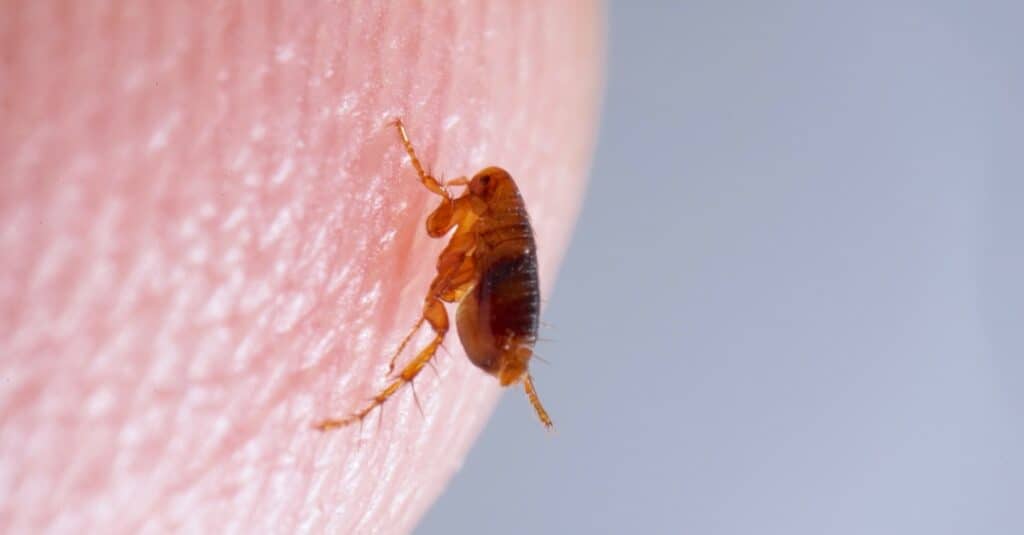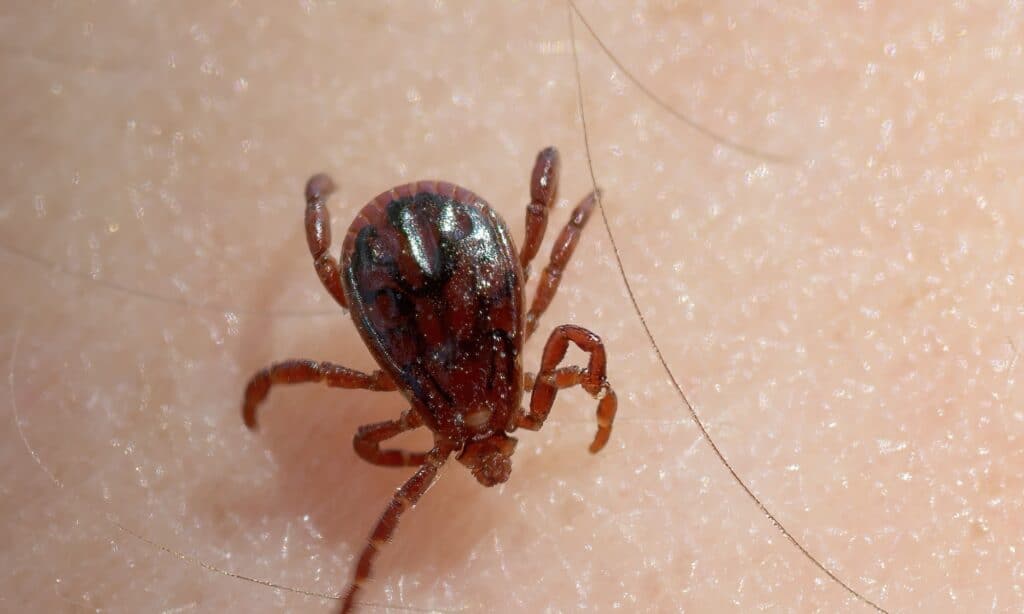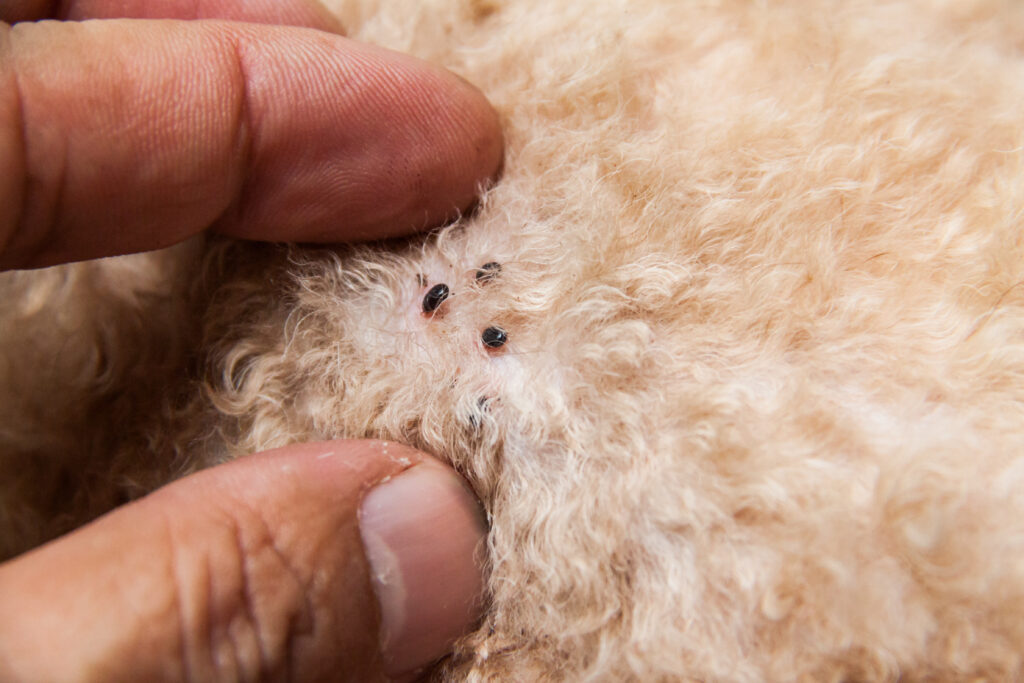An ectoparasite is an organism that lives on the outside layers of a host’s body.
Ectoparasite Meaning
Ectoparasites are creatures that live on the surface of a host, deriving nourishment from the organism or using it as a breeding ground, typically without killing it. Ectoparasites are frequently insects or insect-like organisms such as arthropods. They can infest many sorts of animals and even humans, causing physical discomfort and other harm to the host.
The cause of the discomfort stems from the fact that ectoparasites can burrow into or consume parts of the host. These creatures can consume the hair, skin, and blood of the host, causing pain, allergic reactions, itchiness, and more.
The length of time that the parasite stays with the host can vary from minutes to over a month depending on the nature of the organism and its needs.

Ectoparasites are often discovered from the discomfort they cause.
©iStock.com/adogslifephoto
Examples of Ectoparasites
Several different organisms engage in this unique sort of parasitism. Ectoparasites include arthropods, insects, nematodes, and other creatures. However, ectoparasites come in a variety of forms, and they do not all have the same parasitic goals.
Some examples of these creatures include the following:
- Mites
- Fleas
- Ticks
- Lice
Several types of mites can live on human skin, especially around the hair follicles of mammals. For example, Demodex is a genus of mites commonly found living on humans.
Fleas are small insects that consume their host animal’s blood. They often cause itching and pain while feeding on hosts, and they’re capable of transmitting serious diseases between animals.
Ticks are blood-sucking arachnids that secrete a chemical so that the host doesn’t feel their bite. They latch onto their host and feed for long periods of time, upwards of days.
Lice are also small insects that consume the blood of their host animal. Head lice are common parasites on human scalps and may live for about 30 days, causing itchiness and the potential for secondary infections.
These common and well-known ectoparasites use their host as a place to live as well as a means of feeding themselves.

Causing intense itching, fleas are a nuisance to humans and pets alike.
©iStock.com/S.Rohrlach
Are Mosquitos Ectoparasites?
Yes, mosquitos can be considered ectoparasites in a broad sense. However, a narrower view of these parasites would disqualify them from being called ectoparasites since they do not truly live on the body of their hosts. Mosquitos merely visit the host when they need to feed, and then they depart until they must feed again.
The Benefits Obtained by Ectoparasites
Every type of parasitism only continues to exist as long as it provides evolutionary advantages to the parasite. In the case of ectoparasites, the organisms obtain several benefits from living on and consuming their host.
Ectoparasites gain the ability to have food available to them, a chief concern of most organisms. Furthermore, they do not waste energy finding food when it is readily available to them. Also, they gain the ability to live in a somewhat safe environment considering that their host will often seek shelter in a place with conditions favorable to them as well as the parasite. Lastly, ectoparasites live on the outside of an organism, so they can readily reproduce and spread their offspring to other creatures.
These benefits to ectoparasites ensure that the organisms have comfort and safety until they reproduce in many cases.

Ectoparasites get the benefit of having a nearby food source and more.
©iStock.com/RobertAx
Detriments to Ectoparasites
Acting as an ectoparasite can come with some detriments, though. First off, without a host, some parasites can quickly die off. That does not hold true in all cases, though. Some ticks can survive for over a year without access to a host.
Still, another detriment to this form of parasitism is that the creature’s presence is a nuisance to the host. The itching, pain, lesions, and wounds caused by these parasites will often make the host attempt to rid themselves of the parasites.
This is especially true in the case of humans along with the animals in their care. Humans spend billions of dollars every year killing ectoparasites on themselves, their pets, and animals in agriculture. As a result, many ectoparasites are killed off solely because they live in an area where their host can easily kill them.
No parasitic relationship between an organism and a host is without complications or potential drawbacks for the parasite.

Humans spend billions of dollars to rid their pets of ectoparasites like fleas.
© ThamKC/Shutterstock.com
What Parasites Live Inside of a Host?
Ectoparasites are unique in that they live on the outside of their host or in the first few layers of their skin. However, some parasites live inside of their host, and they are called endoparasites.
Any creature that lives in the tissue and organs of its host is one example of an endoparasite. Tapeworms live in the digestive tract of some animals, including humans. These organisms directly feed off the food that the animal consumes. Identifying these parasitic infestations is more difficult since the symptoms of their presence are harder to notice compared to ectoparasites.
The botfly is an endoparasite that lays its eggs on the skin of mammals. Once the eggs hatch, the larvae burrow into the creature where they feed on the host’s living tissue before reaching maturity and leaving the body.
Endoparasites and ectoparasites both feed on their host, but they use different methods to stay alive.






